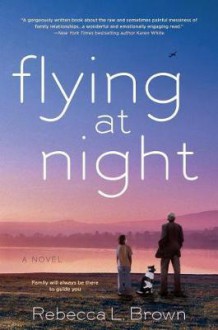

Rebecca Grace Allen is an author of sweet, sexy and soul searching romance, emphasis on the sexy! She holds a Bachelor of Arts in English with a double concentration in Creative Writing and Literary Comparison, as well as a Master of Science degree in Elementary Education, both of which seemed like good ideas at the time. After stumbling through careers in entertainment, publishing, law and teaching, she's returned to her first love: writing. A self-admitted caffeine addict and gym rat, she currently lives in upstate New York with her husband, two parakeets, and a cat with a very unusual foot fetish.Author Bio:

The plot of Flying at Night, the character driven debut novel by Rebecca L. Brown is a relatable one. It is about a family redefining itself and rediscovering itself in light of a medical crisis and a medical diagnosis. The book is touching, and the ending is a surprise to me. In hindsight, I can see it, but not in first reading the book. It leaves me thinking.
Reviewed for Penguin First to Read program.

Never before has a book so completely spoken to my heart. I originally found this last year when I was looking around for around for women's memoirs to be put into my Diverse Books Tag focused on that genre (a book with a biracial protagonist). I recommended it to my library but got quickly absorbed in a number of other books while I waited for it to be available or for the right time to pop up. At last, my library purchased it and I was the first one to get it when it came out.
I have to say that waiting for the right time worked out fantastically. Some books just seem to know when you need them. As I said, this one just spoke right to my heart. That's not to suggest that I "know" what it was like for Rebecca Walker to navigate her life or what it's like to be black and white and Jewish all at the same time. What I do know is that I am quite familiar with that sense of not quite belonging to anyone, but maybe belonging enough to be claimed here and there for this or that trait. I have drifted from one home to another within my family or neighborhood or group of friends and felt that change that Walker describes as "switching radio stations". I've felt the sting of being in one group while people denigrate the other part of you, the part that they don't claim, while they insist that it's not you but you know that it is, even if only in part. I've felt it on both sides of me.
We've lived vastly different lives in different times within this country and I couldn't possibly relate to all of Walker's experiences, but I had never known anyone to describe this being and not being so well, so beautifully. The idea of being a "movement baby" sounds terrifying, like for too much to live up to. Later, I found it far easier to relate to what happened when the ideas of the movement were gone and she was treated like her existence was half-oppressor and half-oppressed, when people asked her navigate those waters and explain what it felt like. I was never able to explain what it was like to be fragmented this way and now I have someone to turn to for that.
I loved Walker's style of writing and relating everything back to memory and the way that memory shifts, that way that it can be wrong and right at the same time and the way it shapes us and perceptions of us without ever asking for permission. I loved the poetic feel that accompanies most of the book. I peaked at some other reviews and it's not the kind of book that everyone loves, but I still find it an important book to read and discuss. Perhaps it would make a great book club memoir because it does bring in questions of race on several fronts and it could open conversations about sex in adolescence, the effect of divorce and/or neglect on a child's upbringing and other important issues that Walker goes through that still plague us.
The downside to that, of course, is that using the book that way invites criticism of Walker and her parents as people who were theoretically doing the best they could. I don't mean to sound like I doubt that anyone was doing their best but I also don't want to make it sound like I'm making assumptions about what could/should have been done. The point is simply that getting judgey about someone's life and story like this would miss the point of reading the book.
Despite what others might think, I found this book engaging, even at it's lowest moments. I appreciated the way it was a little episodic, moving through periods in her life and only stopping to fit in the moments that best sums up the time-frame for her rather than dwelling on incidentals. As mentioned above, what I loved the most was the way she relates what it is like to not fit succinctly into any single category of race, to be a part of something and not a part of it at the same time, close and yet removed from it. I have felt these things so many times in life when I am in Hispanic or not Hispanic depending on the way whoever I'm talking to feels about it and it rarely seems up to me to let them know who I am and how I fit into these categories and whether or not I even want to.